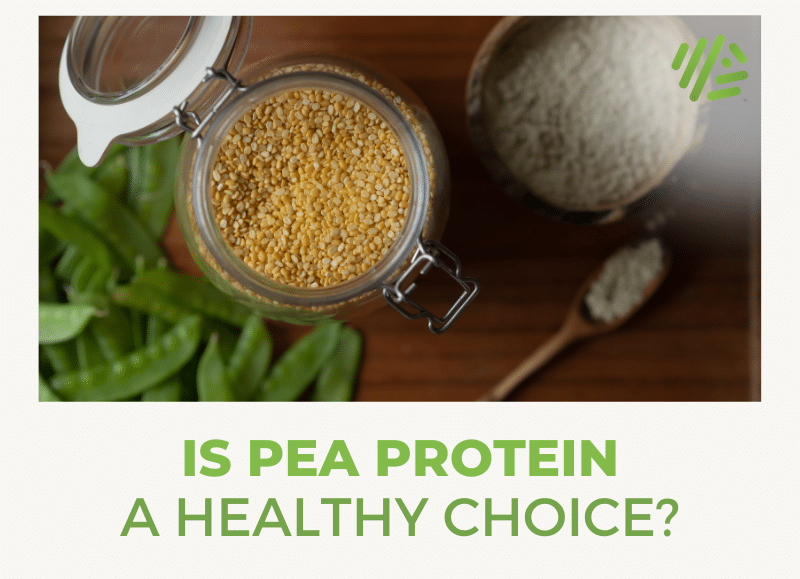Is Pea Protein a Healthy Choice?
Article at a Glance
- Pea protein is a healthy, plant based form of protein that contains all 9 essential amino acids.
- Pea protein is low in methionine, an inflammatory amino acid.
- Pea protein is a good source of iron.
- Some studies have found pea protein to be more effective at building muscle than whey protein.
- Our favorite pea protein, Nuzest, is free of lectin and food allergens and is made with only 3 ingredients.

Contents
Quality sources of protein are essential for maintaining a healthy body. Dietary proteins are composed of amino acids, which serve as building blocks in all systems of the body. The quality and availability of these amino acids is highly dependent on the source.
Variety is key when it comes to most dietary decisions, and protein is no exception. People most often turn toward animal products to boost their protein intake, but there are several plant-based options that are just as, if not more, effective with a lower carbon footprint and better implications for overall health. Pea protein is one of those plant-based choices that can help introduce variety to your protein routine.
Protein supplementation has had quite an evolution in the past few decades with a huge boom recently. There was a time not too long ago that whey and soy proteins dominated the market, without a lot of other choices. The past decade or two have led the way to huge innovations in protein supplements, including an increased variety of sources.
Pea protein is derived from yellow peas
Pea protein in particular seems to have found its way out of the shadows and into the spotlight in recent years. I’m sure the name pea protein conjures up those sweet green peas, but it is actually most often made from split yellow peas. The protein is extracted from split yellow peas and made into a powder to mix into smoothies, baked goods, and anything else that needs a protein boost. Studies have shown that the protein content of pea protein is comparable to the protein found in wheat, brown rice, milk, and even human muscle.
The mean essential amino contents were also comparable to egg, milk, and human muscle. Pea protein is generally high in the amino acid lysine, and low in methionine.
A Quick Note on Ripple Pea Milk
You can probably already tell that we love certain brands of pea protein as a healthy alternative to allergen rich proteins like whey and soy. Having said that, we aren’t big fans of Ripple, the pea milk product that is gaining traction in health food stores nationwide.
Why?
Additives. It’s made with all sorts of bad stuff, sunflower lecithin being a particularly bad offender, not to mention all the added cane sugar. Check out my search for the best milk alternatives to find plant based milk brands we recommend.
Free from Allergens
Because it’s naturally vegan and free of the most common food allergens, pea protein has been turned to as a safe and effective way to increase protein consumption.
That means pea protein is a great choice for those following soy, dairy, nut, and gluten free diets.
Amino Acid Profile of Pea Protein
Pea protein has all of the 9 essential amino acids to make it a complete protein. An essential amino acid is one that we need to get from our diets. They serve as the building blocks to build and support our body functions, energy production, repair and proper development. While pea protein is a complete protein, it is low in one essential amino acid: methionine.
Some effective plant sources of methionine are brazil nuts and sesame seeds. If you’re eating some animal protein, you’ll get plenty of methionine from meat and eggs. For Vegans, as long as you eat a variety of plant protein sources, the low methionine in pea protein should not be a problem. And while methionine is an essential amino acid that you want in your diet to some degree, it is one of the pro-inflammatory amino acids (along with the BCAAs and tryptophan) that many researchers, including Valter Longo, recommend reducing as a strategy for increasing longevity.
From this perspective, it’s a good thing that pea protein is low in methionine.
Pea Protein is Rich in Iron
One argument for the consumption of meat-based protein is the inclusion of iron. But pea protein is unique in that it is a rich source of iron. Because plant-based iron is not as easily absorbed as its meat-based counterparts, it is good to try to incorporate foods rich in Vitamin C with plant-based iron sources to increase absorption. Several studies have demonstrated that Vitamin C strongly promotes the absorption of dietary iron.
Pea Protein and Cardiovascular Health
If maintaining or improving heart health is your goal, pea protein is a great choice. Animal studies have proven pea protein’s ability to provide antihypertensive effects. This means pea protein has the ability to lower blood pressure, especially in the first few weeks of use (R). Additionally, pea protein also demonstrated an ability to decrease total cholesterol and triglyceride levels. One animal study showed that pea protein effectively lowered both of these markers for cardiovascular disease in the course of 3 weeks of treatment (R).
Pea Protein and Muscle Growth
Many who use protein supplements have the goal of building lean muscle. While “getting swoll” is not the only benefit of protein supplementation, it is one strongly promoted by pea protein. Pea protein was shown in one study to promote a greater increase of muscle thickness than whey protein in a placebo-controlled clinical trial (R).
See also John’s post on Vegan Bodybuilders.
Another study showed that the muscle mass gains from pea protein were equal to that of whey protein (R). This means that pea protein is as effective or more effective than whey protein in building healthy, strong muscles. Both of these results were demonstrated when protein supplementations was added to a consistent exercise routine, as exercise is essential to building muscles.
Increases Satiety
Protein has been studied for its effect on satiety. A study demonstrated that protein supplementation was the only macronutrient to effectively satiate participants, leading to a reduced caloric intake in the meal that followed. This effect was seen equally in whey and pea proteins (R). So choosing a pea protein supplement to start your day, like this Classic Tom Brady Smoothie, is a good choice to keep hunger at bay and experience less cravings.
Good for the Environment
The health of our bodies is the basis for our food choices, but the health of the planet is also an important factor to consider. When compared with animal-based alternatives, pea protein is an especially sustainable choice. Animal production has a large carbon footprint. If we could reduce our consumption of animal-products through alternatives like pea protein, we could reduce the overall carbon footprint of our food system.
The Bottom Line
While pea protein is certainly not the only plant-based option for protein supplementation, it has proven itself a worthy contender in numerous studies. It is one of the few plant-based proteins to contain all 9 essential aminos acids. It is easily digested, readily available, and comes with an array of health benefits. If you’re depending solely on meat intake for your protein needs, now may be the time to try some pea protein and experience some of the benefits we’ve discussed.



